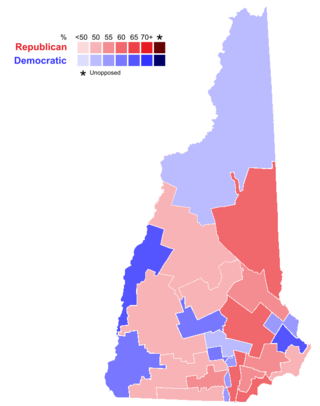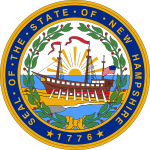The Democratic Senatorial Campaign Committee (DSCC) is the Democratic Hill committee for the United States Senate. Its purpose is to elect Democrats to the United States Senate. The DSCC's current Chair is Senator Gary Peters of Michigan, who succeeded Nevada's Catherine Cortez Masto after the 2020 Senate elections. DSCC's current executive director is Christie Roberts.
The New Hampshire Democratic Party (NHDP) is the affiliate of the Democratic Party in the U.S. state of New Hampshire. Its chair is Raymond Buckley, and its vice chairs are Martha Fuller Clark and Bette Lasky. The most recent Democratic governor was Maggie Hassan, who served from 2013 to 2017.
New Hampshire is often noted for its moderate politics and its status as a prominent swing state. Voters predominantly selected Republicans for national office during the 19th and 20th centuries until 1992. Since then, the state has been considered a swing state. Since 2006, control of the state legislature and New Hampshire's congressional seats have switched back and forth between Republicans and Democrats. Although the state has voted for the Democratic candidate in the last six presidential elections since 2004, it has done so by relatively small, however consistent margins.

Margaret Coldwell Hassan is an American politician and attorney serving as the junior United States senator from New Hampshire since 2017. A member of the Democratic Party, Hassan was the 81st governor of New Hampshire from 2013 to 2017.

The 2008 United States elections were held on Tuesday, November 4, 2008, during the war on terror and the onset of the Great Recession. It was considered a Democratic wave election, with Democratic Senator Barack Obama of Illinois defeating Senator John McCain of Arizona by a wide margin, and the Democrats bolstering their majorities in both chambers of Congress, thereby marking the first time since 1992 in which the Democrats won Congress and the presidency in one election.

Elections in the U.S. state of New Hampshire are held at national, state and local level. The state holds the first presidential primary in the national cycle. Elections for a range of state positions coincide with biennial elections for the House of Representatives.

The 2000 United States elections were held on November 7, 2000. Republican governor George W. Bush of Texas defeated Democratic Vice President Al Gore of Tennessee in the presidential election. Republicans retained control of both houses of Congress, giving the party unified control of Congress and the presidency for the first time since the 1954 elections.

The 1996 United States elections were held on November 5, 1996. Democratic President Bill Clinton won re-election, while the Republicans maintained their majorities in both houses of the United States Congress.

The 1992 United States elections elected state governors, the president of the United States, and members of the 103rd United States Congress. The election took place after the Soviet Union crumbled and the Cold War ended, as well as the redistricting that resulted from the 1990 census. Often considered "The Year Of The Woman," these elections brought an increased number of female politicians to Washington such as Dianne Feinstein (D-CA) and Carol Moseley Braun (D-IL). Governor Bill Clinton of Arkansas defeated incumbent president George H. W. Bush and businessman Ross Perot in the presidential election. The Democratic Party maintained their control of both chambers of Congress. This is the first Democratic trifecta since the Republican victory in the 1980 elections and the last one during the 20th century and the last one overall until 2008.

Presidential primaries and caucuses were organized by the Democratic Party to select the 4,051 delegates to the 2016 Democratic National Convention held July 25–28 and determine the nominee for President in the 2016 United States presidential election. The elections took place within all fifty U.S. states, the District of Columbia, five U.S. territories, and Democrats Abroad and occurred between February 1 and June 14, 2016. Between 2008 and 2020, this was the only Democratic Party primary in which the nominee had never been nor had ever become President of the United States. This was the first Democratic primary to nominate a woman for president.

The 2016 United States Senate election in New Hampshire was held November 8, 2016, to elect a member of the United States Senate to represent the State of New Hampshire, concurrently with the 2016 U.S. presidential election, as well as other elections to the United States Senate in other states and elections to the United States House of Representatives and various state and local elections. The primary election to select the candidates who appeared on the general election ballot took place on September 13, 2016.

The 2016 United States elections were held on Tuesday, November 8, 2016. Republican nominee Donald Trump defeated Democratic former Secretary of State Hillary Clinton in the presidential election, while Republicans retained control of Congress. This marked the first time Republicans won or held unified control of the presidency and Congress since 2004, and would not do so again until 2024.

The 2018 United States elections were held on Tuesday, November 6, 2018. These midterm elections occurred during Incumbent Republican President Donald Trump's first term. Although the Republican Party increased its majority in the Senate, unified Republican control of Congress and the White House was brought to an end when the Democratic Party won control of the House of Representatives in what was widely characterized as a "blue wave" election as Democrats also gained governorships, other statewide offices, and state legislative chambers.

The 2016 United States presidential election in New Hampshire was held on Tuesday, November 8, 2016, as part of the 2016 United States presidential election in which all 50 states plus the District of Columbia participated. New Hampshire voters chose electors to represent them in the Electoral College via a popular vote, pitting the Republican Party's nominee, businessman Donald Trump, and his running mate Indiana Governor Mike Pence, against the Democratic Party's nominee, former U.S. Secretary of State Hillary Clinton, and her running mate Virginia Senator Tim Kaine. New Hampshire has four electoral votes in the Electoral College.

The 2016 United States presidential election in West Virginia was held on November 8, 2016, as part of the 2016 General Election in which all 50 states plus the District of Columbia participated. West Virginia voters chose electors to represent them in the Electoral College via a popular vote pitting the Republican nominee, businessman Donald Trump, and running mate Indiana Governor Mike Pence against Democratic nominee, former Secretary of State Hillary Clinton and her running mate, Virginia Senator Tim Kaine.

The 2016 United States presidential election in Washington took place on November 8, 2016, as part of the 2016 United States presidential election. Washington was won by Hillary Clinton, who won the state with 52.54% of the vote over Donald Trump's 36.83%, a margin of 15.71%. All of the state's 12 electoral votes were assigned to Clinton, though four defected. Trump prevailed in the presidential election nationally.

The 2022 United States Senate elections were held on November 8, 2022, concurrently with other midterm elections at the federal, state, and local levels. Regularly scheduled elections were held for 34 of the 100 seats in the U.S. Senate, the winners of which will serve 6-year terms beginning with the 118th United States Congress. 2 special elections were held to complete unexpired terms. While pundits considered the Republican Party a slight favorite to gain control of the Senate, the Democrats outperformed expectations and expanded the majority they had held since 2021, gaining a seat for a functioning 51–49 majority.

The 2016 New York state elections took place on November 8, 2016. Presidential primary elections occurred on April 19, 2016, congressional primary elections occurred on June 28, 2016, and state and local primary elections occurred on September 13, 2016. One U.S. Senate seat and all 27 seats in the U.S. House of Representatives were up for election, as were all 63 seats in the New York State Senate and all 150 seats in the New York State Assembly. The 2016 United States presidential election occurred on the same date as the general election.

The 2016 New Hampshire Senate election was held on November 8, 2016, concurrently with the elections for the New Hampshire House of Representatives, to elect members to the 165th New Hampshire General Court. All 24 seats in the New Hampshire Senate were up for election. It resulted in Republicains maintaining control of both chambers of the New Hampshire General Court.

The 2024 United States presidential election in New Hampshire took place on Tuesday, November 5, 2024, as part of the 2024 United States elections in which all 50 states plus the District of Columbia participated. New Hampshire voters chose electors to represent them in the Electoral College via a popular vote. The state of New Hampshire has four electoral votes in the Electoral College.

















